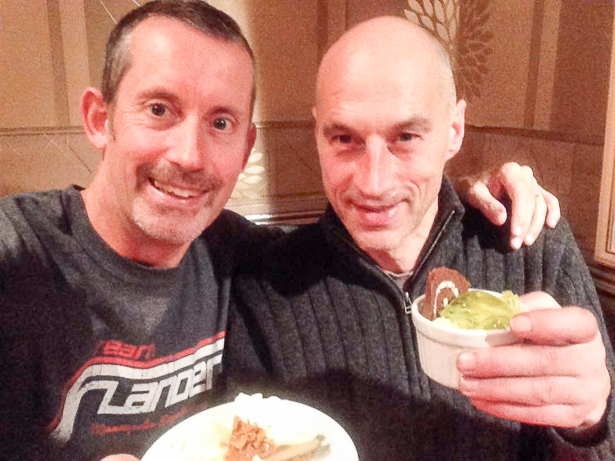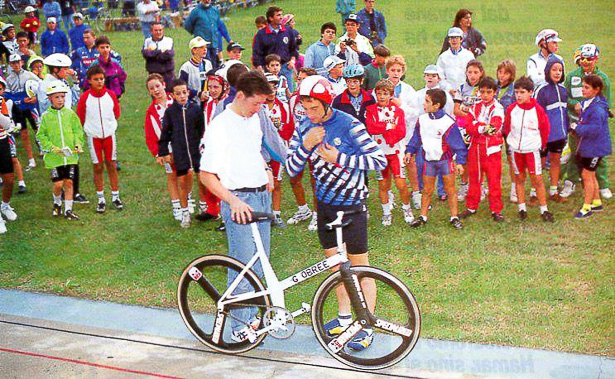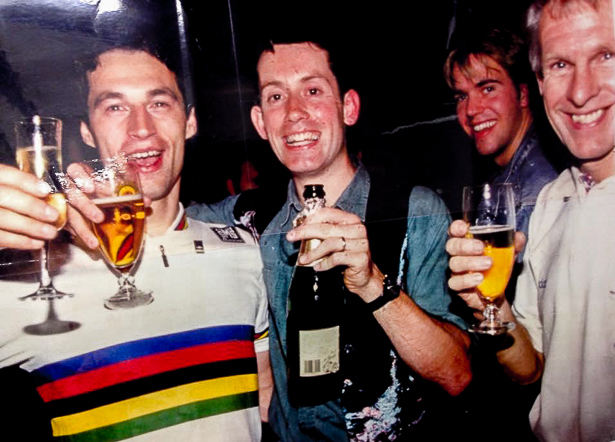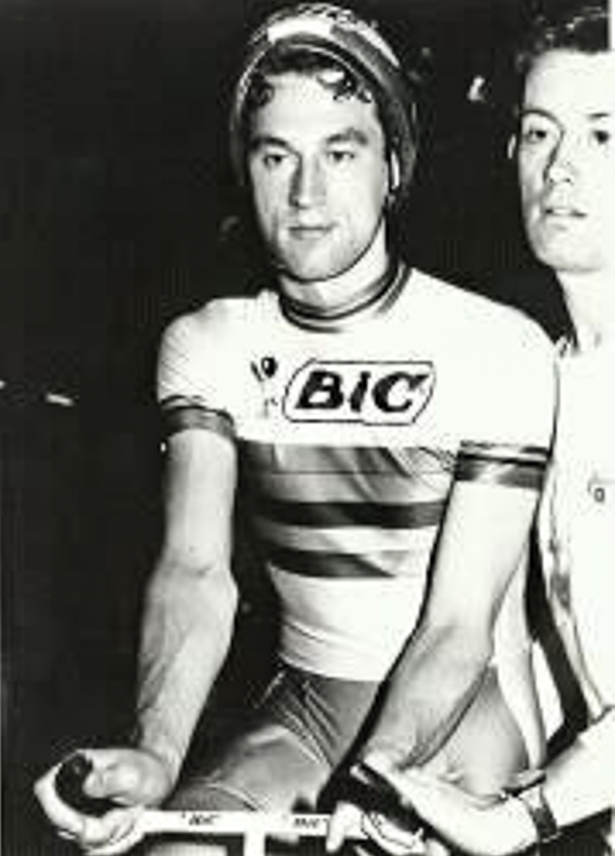In part one of our interview with Martin Coll we discussed his career – but any chat with Martin wouldn’t be complete without mention of the times he spent with his brother-in-law; the legend that is Graeme Obree.
Martin became The Flying Scotsman’s manager, confidante, driver and personal assistant during the period when Graeme and ‘Old Faithful’ were much in demand on the continental boards.
Some said that your moving to the US was a result of your disillusionment when you and Graeme parted company?
“No, not all – my wife and I had planned to move to the USA before the opportunity with Graeme came along but we shelved that when I began working with him.”

How did the partnership come about?
“Graeme and I are married to two sisters, so we’re family.
“I picked Graeme up at the airport after he came back from Hamar and setting the Hour Record; we talked and I quit my job to work full time with him.”
What happened to make Graeme dispense with Vic Haines as his manager/mentor?
“I’m not sure but I think it was Graeme – he didn’t like the way things were going with Vic, he could see there was going to be pressure on him with the Media and he thought Vic’s ideas were more like those of a boxing promoter.
“And there was the aspect of Vic trying to force Mike Burrows’ bike onto him; but Graeme is a hard man to work with – very strong-willed.”
His first world pursuit title, 1993?
“Doug Dailey (GB Track Team head at the time, ed.) picked us up at Hamar two days before the Worlds; two days later Graeme was world champion – a great experience.
“Graeme was very smart with how he paced his ride in qualifying, he was second to Ermenault there with a 4:24 and in the semis was against Chris Boardman, who he beat. Then he had Ermenault in the final.
“But right from the start he knew he was going to win.
“And of course, he took his second title in the ‘Superman’ position two years later in Bogota ahead of the Italian Andrea Collinelli – but we’d separated by then.”

Sicily ’94 was where he encountered the wrath of the UCI, wasn’t it?
“That was shocking – it was victimisation.
“Hein Verbruggen, who was head of the UCI at the time, didn’t like Graeme so had his position outlawed.
“Verbruggen didn’t like that Graeme had ‘come from nowhere’ to take the Hour Record and the World pursuit title – he didn’t realise that Graeme had been involved in bike racing for a long time.
“I liked what Laurent Fignon said at the time; ‘you don’t become a world champion overnight’ he understood that there must have been so much work behind Graeme’s successes.”
Graeme was hot property on the European circuit at that time.
“In Belgium, France and Italy he was huge… one of the biggest stars on the cycling scene at the time.
“I remember one time he was riding against an Italian team pursuit selection. They went through their full warm up to prepare for the ride whilst Graeme chatted to journalists before the start then rode one lap to get ready.
“He was always slow to start because he was riding that huge gear so the Italians were up on him to start with – but gradually he pegged it back and beat them by a hair.
“I remember one of the Italian guys being really upset after the finish, he was in distress from his efforts but most of all because he couldn’t understand how Graeme could just jump on his bike and beat an Italian national team like that.
“Graeme was getting contracts all over Europe at the time. I remember we were driving to a track in Italy and the traffic jams were terrible, Graeme said to me; ‘I wonder what’s going on?’
“I said to him; “they’re coming to see you!”
“The three main TV channels were there that day – Francesco Moser was there; we tucked his socks in his trousers and he rode a lap or two on Graeme’s bike; the crowd went mad!”

Graeme made appearances at the Six Days too…
“Yes, Graeme rode at every Six, often as an exhibition to challenge the track record because no-one wanted to go up against him.
“He established pursuit track records all around the Six Day circuit.
“I particularly remember in Geneva there was a “Boardman v. Obree” challenge pursuit and Gianni Bugno, Viatcheslav Ekimov, Maurizio Fondriest, Eddy Merckx were all there.
“The lights dimmed and Graeme and Chris came in under the spotlights with Van Halen’s ‘Jump’ playing – it was fabulous.
“In events like that the promoter decides who’ll win – they wanted Graeme to take it.
“Chris asked what the script was, Graeme just said to him to ride his own race, he was going to beat him whatever he did – and of course, he did!
“Then at the Grenoble Six Day; the ex-Tour de France winner, Bernard Thevenet was the organiser.
“Graeme was riding an exhibition pursuit against the top French pursuiter, Philippe Ermenault and Thevenet said he wanted a straight race – no ‘arrangements.’
“Graeme smashed the track record and caught the Frenchman – Thevenet just smiled and shrugged, he got what he wanted.”
But I believe Graeme could be hard work?
“Extremely hard work – he’d been involved with Phil Griffiths and Vic Haines previously but I don’t think either of them realised what they were getting into.
“He could switch you off and walk away; he was special, introverted, a genius – guys like that don’t want help.
“I wasn’t just his manager, I did the flights, the driving – Graeme didn’t drive – everything except anything to do with his training – he did that all on his own.
“He wasn’t like Chris Boardman; backed up by Peter Keen, sports science and technology – Graeme did his own thing in training.
“The same with his bikes – there was one. No spare, even at the Worlds.
“His starting effort on that huge gear used to deflect the rear end so much that the tyre would rub on the chainstays – we didn’t tell Doug Dailey about it, but the GB mechanic, Sandy Gilchrist had to change the rear tyre after every ride because the side walls were scuffed away.
“Then of course there was the time the bottom bracket broke off…”

When did you part company?
“In 1994.
“He won the Worlds in ’95 with the ‘Superman’ position but after that things went downhill – he had demons, there was depression, a struggle with alcohol, and his brother died in a car crash.
“He came to visit us here in the US in a very depressed state.
“As I said, Graeme’s brain works in it’s own way, it makes him tough to work with – he can just drop people and move on.
“I think he’s in a better place now though – I come home once a year to see my family and we always catch up.”
And you’ve been in the States since 1994?
“Yes, there are great opportunities here, more so than in Scotland, we’ve built a good life here.”
With thanks to Martin. It’s easy to forget just how special Graeme Obree really was, it was nice to be reminded.



